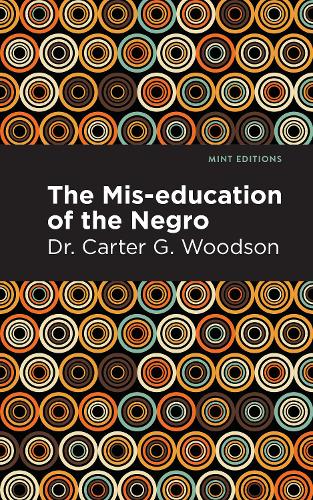
The Miseducation of the Negro
(Paperback)
Publishing Details
The Miseducation of the Negro
By (Author) Carter G. Dr. Woodson
Contributions by Mint Editions
West Margin Press
West Margin Press
26th April 2023
United States
Classifications
General
Non Fiction
Ethnic studies / Ethnicity
370.8996073
Physical Properties
Paperback
400
Width 127mm, Height 203mm
Description
History shows that it does not matter who is in power... those who have not learned to do for themselves and have to depend solely on others, never obtain any more rights or privileges in the end than they did in the beginning.
Dr. Carter G. Woodson was an extraordinary scholar and an important figure in the Afrocentrism movement. Being one of the first people to study African-American history and the history of the African diaspora at large, he is known today as the Father of Black History, for his incredible contributions to the field. His magnum opus, The Mis-education of the Negro (1933) and its spiritual predecessor The Education of the Negro Prior to 1861 (1919) are considered to be among the most comprehensive studies of the history of African-American education in the United States published in the early twentieth century.
As individual works, The Education of the Negro Prior to 1861 functions as a documentation of the ways in which obtaining education provided mental and intellectual freedom to both enslaved and freed Africans in America; and The Mis-education of the Negro explores the effects of slavery on Black minds, challenging the effectiveness and overall intent of the United States Educational System in regard to the cultural indoctrination of Black Americans.
Together, these two works laid the foundation for Woodsons argument in favor of Black History Week, which would eventually grow to be recognized nationally as Black History Month; and are essential to the cultural understanding of the importance in recognizing African-American history as a legitimate field of study.
Professionally typeset with a beautifully designed cover, this edition of The Mis-education of the Negro is an indispensable reimagining of a crucial work of Black History for the modern reader.
Author Bio
Dr. Carter G. Woodson(1875 - 1950) was an author, historian, scholar, and founder of the Association for the Study of African American Life and History. Born to an extremely poor family of formerly enslaved Africans, Woodson grew up on a farm in New Canton, Virginia. Largely self-taught due to a lack of consistent access to school, Woodson was nevertheless able to master most academic subjects and carry with him the pride of being born free. He left home with his older brother at the age of seventeen in hopes of pursuing secondary education at the Douglass High School and despite many hardships, worked tirelessly until he was able to achieve that goal and receive his diploma. Over the next twenty years, he would begin his academic career and embark on an educational journey from the University of Chicago to Harvard, becoming the second African-American to earn a doctorate and theonlyAfrican-American to be born of enslaved parents and receive a doctorate in History. Despite his many academic achievements, Woodson was shut out of employment opportunities in higher education due to racism andgrowing increasingly frustratedhe set out to create an institution that would make it possible for Black scholars to study the history of their people. With the aid of William D. Hartgrove, George Cleveland Hall, Alexander L. Jackson, and James E. Stamps, Woodson founded the Association for the Study of Negro Life and History in 1915. The very next year, the Association would begin publishingThe Journal of African American Historywhich would be released quarterly without fail even in the face of massive economic downturn and world war. Woodson also worked tirelessly to produce his own books on African-American History over the next thirty years including but not limited to:A Century of Negro Migration(1918),The Education of the Negro Prior to 1861(1919),The History of the Negro Church(1921) the first survey of free Black slaveowners in the United States,Free Negro Owners of Slaves in the United States in 1830(1924) and his magnum opus,The Mis-education of the Negro(1933). During this period of continuous academic output, Woodson also called for the celebration of Negro History Week. First observed in 1926, Woodson sought to emphasize the Negro in history, with parades, speeches, poetry readings, and lectures. Woodsons effortsboth academic and politicalalso placed him at the center of Black intellectual life throughout the late 1920s and early 1940s, he even wrote for Marcus Garveys newspaperThe Negro Worlduntil knowledge of Garveys meetings with the Klu Klux Klan became public. Having completely dedicated his life to the research, Woodson lived out the rest of his days devoted to the preservation of African-American history. While he would meet his ultimate end in 1950, Dr. Carter G. Woodsons life and work continue to live on in America today.
